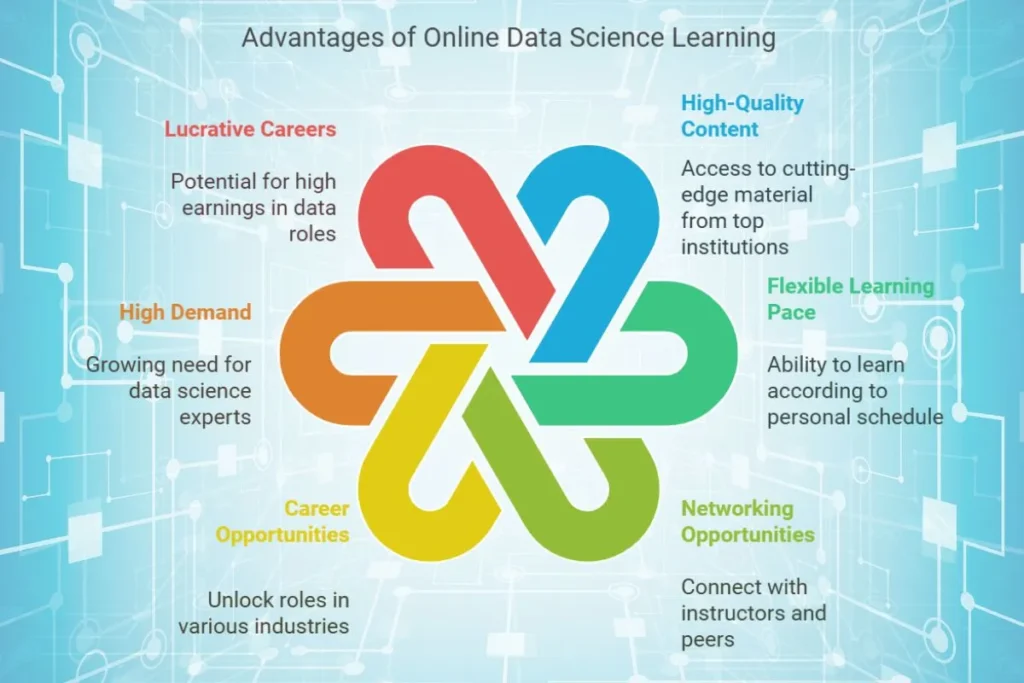Data science continues to grow as one of the most growing fields. As more businesses rely on tips and information derived from data, learning data science skills can be much more valuable. Many data science courses online platforms offer readily available and high quality courses made for various experience levels, budgets and career goals.
This guide explores some of the top platforms for online data science courses in 2025, including Coursera, edX, Udemy and Udacity. It also provides information like course offerings, pricing and target audiences.
Why Learn Online Data Science Courses
Online learning provides flexibility, a variety of resources and the chance to learn at your own pace. Here’s why online courses are ideal for data science:
– Access to High Quality Content: Leading universities and tech companies partner with online platforms, offering cutting edge material in data science.
– Learn at Your Own Pace: Online courses allow you to fit learning around your schedule, ideal for working professionals.
– Networking Opportunities: Many courses offer forums, group projects and mentorship, which allows you to connect with instructors and peers in the field.
– Career Opportunities: With Data science expertise, you can unlock opportunities in industries like finance, healthcare, retail and tech. Jobs include data scientist, ML engineer, AI researcher and more.
– High Demand: The demand for Data science experts continues to grow across industries like healthcare, finance and tech.
– Lucrative Careers: AI engineers and data scientists often earn higher salaries.
– Flexibility: Online learning platforms provide courses suitable for beginners, intermediate learners and experts. Whether you’re a student or a professional, there’s something for everyone.

1. Coursera
Coursera collaborates with top universities like Stanford, Harvard and industry leaders such as Google and IBM. It offers data science courses across skill levels, from beginner to advanced.
– Course Highlights:
– Foundations: Courses like “IBM Data Science Professional Certificate” introduce core skills such as Python, SQL, and data visualization.
– Specializations and Degrees: Programs like the University of Michigan’s “Data Science Specialization” and the University of Illinois’ “Master of Computer Science in Data Science” offer extensive learning paths.
– Industry Projects: Many courses include real world projects, which allows learners to apply knowledge practically.
– Pricing: Prices vary by course. Certifications typically range from $39 to $79 per month, while degree programs cost significantly more, depending on the university.
– Target Audience: Coursera caters to a broad audience, from beginners seeking foundational knowledge to professionals pursuing advanced degrees.
– Real-World Example: A student interested in healthcare data analysis could take the “Healthcare Data Analytics” course offered in collaboration with the University of Washington, to gain practical skills relevant to healthcare.
2. edX
edX offers an impressive selection of data science courses from prestigious institutions, including MIT, UC Berkeley, and Microsoft. It provides verified certificates and micro master programs that are respected in academia and the industry.
– Course Highlights:
– MicroMasters: edX’s “MicroMasters Program in Data Science” by UC San Diego covers key topics like probability, machine learning, and big data analytics.
– Professional Certificates: Options like Harvard’s “Data Science Professional Certificate” offer a structured learning path through core skills in R programming, statistics and machine learning.
– Free Audit Option: edX allows users to audit most courses for free, although certificates require payment.
– Pricing: Course prices range from $50 to $300 for certificates. MicroMasters programs typically range from $800 to $1,500, making them a more affordable alternative to traditional degrees.
– Target Audience: Ideal for learners seeking a solid, university-backed data science foundation. Great for both beginners and professionals seeking career focused skills.
– Real-World Example: For a finance professional, edX’s “Data Science for Business” by Columbia University can provide a business oriented perspective, which makes it easier to apply data analytics in corporate environments.
3. Udemy
Udemy offers thousands of data science courses, created by both industry professionals and educators. It’s known for affordable, beginner friendly content and frequent sales on popular courses.
– Course Highlights:
– Beginner Friendly: Courses like “Python for Data Science and Machine Learning Bootcamp” by Jose Portilla cover foundational data science and machine learning topics.
– Project Based Learning: Many courses include projects, which provides hands on experience in coding and problem solving.
– Variety of Topics: Courses are available on diverse data science topics, from statistics to deep learning and natural language processing.
– Pricing: Courses range from $10 to $200, but Udemy frequently offers discounts, making it highly affordable for beginners.
– Target Audience: Beginners, hobbyists and intermediate learners looking for affordable, short term courses to upskill or gain foundational knowledge.
– Real-World Example: Someone looking to specialize in Python programming for data science can start with the “Complete Python Bootcamp” course, ideal for those starting from scratch.
4. Udacity
Udacity is known for its “Nanodegree” programs, which provide in depth, project based learning experiences. Udacity’s data science programs are co-created with industry giants like Google, Facebook and IBM, which ensures relevance to current market needs.
– Course Highlights:
– Nanodegree Programs: Udacity’s “Data Scientist Nanodegree” and “AI for Healthcare Nanodegree” offer an in depth curriculum focusing on practical applications.
– Career Services: Includes services such as resume review and interview preparation, which is a major benefit for job-seekers.
– Mentorship: Each student has access to mentors for feedback and guidance, enhancing the learning experience.
– Pricing: Nanodegrees typically cost $399 per month, though Udacity often offers discounts. Completion time varies, with most taking 3-4 months.
– Target Audience: Intermediate to advanced learners, career switchers and professionals aiming for in depth skills and industry relevant experience.
– Real World Example: A software developer could enroll in the “Data Engineer Nanodegree” to upskill in cloud computing and big data tools, essential for roles in data engineering.
5. DataCamp
DataCamp specializes in data science courses with a focus on coding exercises and interactive learning. It’s a popular choice for beginners and intermediates who prefer a hands on learning approach.
– Course Highlights:
– Skill Tracks: DataCamp offers specific tracks, such as “Data Scientist with Python” and “Data Analyst with R,” designed to build comprehensive skills.
– Interactive Coding Exercises: The platform focuses on practical, interactive coding exercises instead of video-heavy content.
– Focus on Coding Languages: Emphasis on Python, R, and SQL, which are essential programming languages for data science.
– Pricing: DataCamp offers a subscription model at $39 per month or $300 per year, with access to all courses. A free trial is available for initial learning.
– Target Audience: Beginners and intermediate learners looking for coding practice in a structured, guided environment.
– Real-World Example: A marketing professional can take DataCamp’s “Data Visualization with R” track to develop visualization skills, which makes it easier to present campaign performance metrics.
Choosing the Right Platform for You
Each platform has unique strengths, so consider your background, goals and budget before choosing. Here’s a quick guide:
– Coursera and edX: Ideal for those seeking comprehensive, university backed courses with options for certifications and degrees.
– Udemy: Great for affordable, short term learning with a wide selection of beginner friendly content.
– Udacity: Best for learners aiming for career advancement, with hands on projects, mentorship and job preparation.
– DataCamp: Perfect for coding-focused learners who want a highly interactive, practical experience.
Conclusion
If you are a beginner looking to break into data science or a professional aiming to advance your skills, the platforms listed here provide valuable courses to fit your needs. Each course offers a unique approach, which makes it easier to find a learning path that matches your goals.
Investing in a data science course can open doors to profitable roles and help you make data driven decisions in any industry. Choose a platform that suits your learning style, study hard and start your career in data science.
Disclaimer: The websites mentioned above might evolve over time. Always refer to the website and their official documentation for the most accurate and updated information as well as latest offerings, plans and prices etc.

